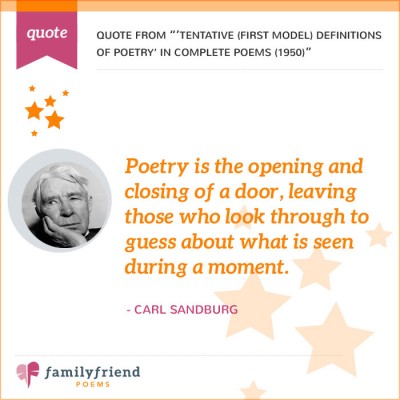
About Carl Sandburg
Carl Sandburg was born on January 6, 1878, in Galesburg, Illinois, to poor Swedish immigrants. Sandburg couldn't continue his education immediately once graduating from eighth grade due to the economic situation of his family. At 13, he worked jobs around his home city to supplement the income of his father from a railroad company in Illinois and his mother's wages as a hotel maid. Despite their money troubles, the Sandburg's instilled in their children the worth of diligence and education.
At the time Sandburg ought to have graduated from high school, he left his hometown and traveled by train to Kansas in search of a job, hiding in train cars to avoid the purchase of a train ticket. When he came back home, he volunteered to fight in the Spanish-American War and served for eight months. His service in the war qualified him for a tuition-free education at Lombard college in Galesburg, where he attended for four years, however, he never received a diploma. There, he met Philip Green Wright, an instructor who inspired the young poet to continue writing and actually funded the publication of his 1st collections of poetry, In Reckless Ecstasy (1904), Incidentals (1907), and The Plaint of a Rose (1909), which were originally printed as leaflets. Sandburg didn't publish poetry for several years, meanwhile, he worked as a journalist, taking a job as secretary to the mayor of Milwaukee, Wisconsin, and married Lillian Steichen.
Sandburg, his new wife and their three children moved to Chicago, Illinois, where he wrote editorials for the Daily News. His poetry was published in Poetry: A Magazine of Verse and several other literary magazines shortly after the move and convinced him to continue writing. Sandburg's poetry celebrates with unwavering conviction all aspects of American life, surely significant for him because of the immigration of his parents. Chicago Poems (1916), Cornhuskers (1918), and Smoke and Steel (1920) were filled with Sandburg's ideas about the American dream, the magnificence of the nation's agricultural and industrial features, and the unique distinction of Americans. Sandburg won the Pulitzer Prize in 1950 for his Collected Poems.
His lifelong interest in Abraham Lincoln, which resulted in two multi-volume biographies, earned him immense respect and the 1939 Pulitzer Prize in History. Sandburg also published popular short story and poetry collections for children, and the New American Songbag (1950), a book of American folklore for adults.
Sandburg continued to travel the world and wrote poetry until his death in 1967 at his home in North Carolina.
DEFINITIONS OF POETRY by Carl Sandburg
Published as "Tentative (First Model) Definitions Of Poetry" In Complete Poems (1950)
- Poetry is a projection across silence of cadences arranged to break that silence with definite intentions of echoes, syllables, wave lengths.
- Poetry is an art practiced with the terribly plastic material of human language.
- Poetry is the report of a nuance between two moments, when people say, ‘Listen!’ and ‘Did you see it?’ ‘Did you hear it? What was it?’
- Poetry is the tracing of the trajectories of a finite sound to the infinite points of its echoes.
- Poetry is a sequence of dots and dashes, spelling depths, crypts, cross-lights, and moon wisps.
- Poetry is a puppet-show, where riders of skyrockets and divers of sea fathoms gossip about the sixth sense and the fourth dimension.
- Poetry is a plan for a slit in the face of a bronze fountain goat and the path of fresh drinking water.
- Poetry is a slipknot tightened around a time-beat of one thought, two thoughts, and a last interweaving thought there is not yet a number for.
- Poetry is an echo asking a shadow dancer to be a partner.
- Poetry is the journal of a sea animal living on land, wanting to fly the air.
- Poetry is a series of explanations of life, fading off into horizons too swift for explanations.
- Poetry is a fossil rock-print of a fin and a wing, with an illegible oath between.
- Poetry is an exhibit of one pendulum connecting with other and unseen pendulums inside and outside the one seen.
- Poetry is a sky dark with a wild-duck migration.
- Poetry is a search for syllables to shoot at the barriers of the unknown and the unknowable.
- Poetry is any page from a sketchbook of outlines of a doorknob with thumb-prints of dust, blood, dreams.
- Poetry is a type-font design for an alphabet of fun, hate, love, death.
- Poetry is the cipher key to the five mystic wishes packed in a hollow silver bullet fed to a flying fish.
- Poetry is a theorem of a yellow-silk handkerchief knotted with riddles, sealed in a balloon tied to the tail of a kite flying in a white wind against a blue sky in spring.
- Poetry is a dance music measuring buck-and-wing follies along with the gravest and stateliest dead-marches.
- Poetry is a sliver of the moon lost in the belly of a golden frog.
- Poetry is a mock of a cry at finding a million dollars and a mock of a laugh at losing it.
- Poetry is the silence and speech between a wet struggling root of a flower and a sunlit blossom of that flower.
- Poetry is the harnessing of the paradox of earth cradling life and then entombing it.
- Poetry is the opening and closing of a door, leaving those who look through to guess about what is seen during a moment.
- Poetry is a fresh morning spider-web telling a story of moonlit hours of weaving and waiting during a night.
- Poetry is a statement of a series of equations, with numbers and symbols changing like the changes of mirrors, pools, skies, the only never-changing sign being the sign of infinity.
- Poetry is a packsack of invisible keepsakes.
- Poetry is a section of river-fog and moving boat-lights, delivered between bridges and whistles, so one says, ‘Oh!’ and another, ‘How?’
- Poetry is a kinetic arrangement of static syllables.
- Poetry is the arithmetic of the easiest way and the primrose path, matched up with foamflanked horses, bloody knuckles, and bones, on the hard ways to the stars.
- Poetry is a shuffling of boxes of illusions buckled with a strap of facts.
- Poetry is an enumeration of birds, bees, babies, butterflies, bugs, bambinos, babayagas, and bipeds, beating their way up bewildering bastions.
- Poetry is a phantom script telling how rainbows are made and why they go away.
- Poetry is the establishment of a metaphorical link between white butterfly-wings and the scraps of torn-up love-letters.
- Poetry is the achievement of the synthesis of hyacinths and biscuits.
- Poetry is a mystic, sensuous mathematics of fire, smoke-stacks, waffles, pansies, people, and purple sunsets.
- Poetry is the capture of a picture, a song, or a flair, in a deliberate prism of words.




